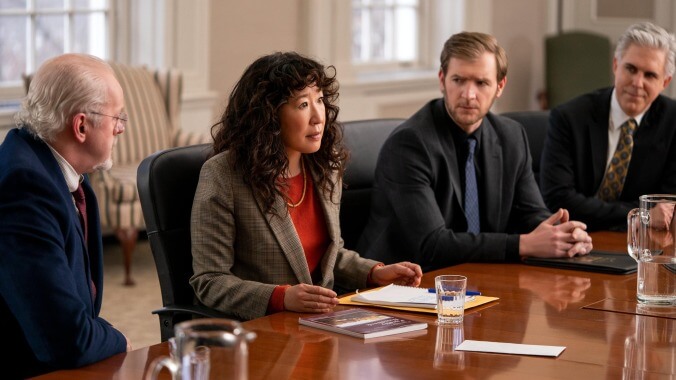The Chair Photo: Eliza Morse/Netflix
So often in pop culture, depictions of college life revolve around students adjusting to the world of academia, ignoring the existence of the many nameless, faceless professors who are actually teaching them. In Netflix’s The Chair, this scenario is flipped so that viewers instead focus on the emotional lives of several faculty members, each of whom is vying for power, respect, and good office space, while also trying their best to impart their love of literature to eager young minds.
Created by Amanda Peet and Annie Wyman, the six-episode series centers on the story of Dr. Ji-Yoon Kim (Sandra Oh) a tenured professor who is the first woman of color to be promoted to Chair of the English Department at the distinguished Pembroke University. While thrilled at the opportunity, Ji-Yoon is also overwhelmed by the pressures of the position, as she suddenly finds herself embroiled in various dramas familiar to anyone who has spent time in academia: the budgets aren’t big enough, too many classes are under-enrolled, and there are tensions between faculty who feel strongly about holding to tradition and those who are committed to questioning the establishment and shaking things up.
Like Dear White People’s fictional Winchester University, Pembroke’s campus setting feels sprawling and regal, with its snow-covered walkways, large windows, and important-looking office spaces, filled with dark wainscoting (so much wainscoting!) and tweed-wearing administrators. Beneath this façade, Pembroke is less “ivory tower” and more “intellectual Thunderdome,” as constant administrative pressures leave many tenured and tenure-line faculty members feeling as though they are in direct competition with one another, rather than being supportive colleagues.
Though The Chair is clearly invested in exploring the experience of being in academia as a quest for power, the heart of the series is the possibility for romance between Ji-Yoon and fellow faculty member Bill Dobson (Jay Duplass) who has been desperately struggling to keep his career together after his wife passed away. Onscreen, Oh and Duplass share a magnetic chemistry that is a consistent pleasure to watch, even as their potential romance becomes more and more complicated—not only by their roles at the university, but also by a scandal involving social media that puts both their careers in jeopardy.
Likewise, the focus on Ji-Yoon’s internal emotional world is made especially riveting through a nuanced performance by Oh, who insists on showing viewers the ways that Ji-Yoon is ambitious, smart, and loving, as well as imperfect. As a woman of color, Ji-Yoon faces considerable racism and sexism from her older white colleagues and an administration that loves to point to her as evidence of their progressivism, while also holding her to higher, and, at times, impossible standards.
Ji-Yoon’s response to these maddening challenges is especially poignant as she tries to support her younger (and untenured) colleague, Dr. Yasmin “Yaz” McKay (Nana Mensah), whose teaching and research is beloved by her students but viewed with suspicion by older white faculty, who perceive her as a threat. While this look at how racism and sexism is deeply entrenched in Pembroke’s administration is deeply compelling, it also overlooks another key problem that many faculty at universities have noted in recent years: the ways in which students themselves, most often due to implicit bias, judge female faculty and faculty of color more harshly than their white, male counterparts.
There are a few other places where a sort of cursory understanding of the current academic climate makes a number of important issues in academia completely invisible. In the world of The Chair, there are no adjunct or contingent faculty struggling to find classes to teach, and no recognition of the ways that English departments have already been adapting to meet the demands of a modern, tech-savvy world. While Yaz’s supposedly shockingly titled course, “Sex And The Novel,” might be perceived as scandalous in period series like Mad Men or The Marvelous Mrs. Maisel, it would hardly raise an eyebrow in the academic landscape of 2021.
Likewise, while it is clear that The Chair is invested in empathetically exploring the ways that older faculty feel left behind, the show too often portrays older professors as stodgy, out of touch, and unwilling to adapt or evolve in a changing world. At times, this stubbornness is touching and funny, as is the case when Dr. Joan Hambling (expertly played by Holland Taylor) discovers to her shock and dismay that she has a terrible RateMyProfessor rating and vows to find out which student is sullying her digital footprint. At others, the disconnect between older and younger faculty just feels a bit like a caricature, one that comes at the expense of a more nuanced look at departmental politics.
Still, coming in at only 30 minutes an episode, The Chair’s writing feels consistently taut, especially when focusing in on Ji-Yoon’s inner world, and the life of her family and close friends. Some of the most moving moments in the series invite viewers into Ji-Yoon’s domestic space, where we see a brilliant scholar who is also a woman with complex desires. While The Chair misses some opportunities to explore the rich world of academia, it succeeds as a warm-hearted look at one department chair’s deeply resonant inner life.


 Keep scrolling for more great stories from The A.V. Club.
Keep scrolling for more great stories from The A.V. Club.